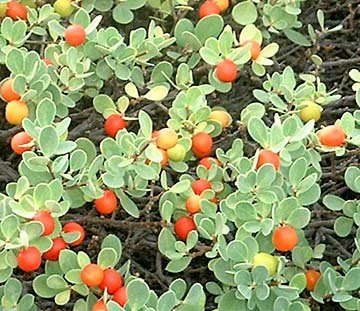
In the Garden![]()
Rick Barboza
HUI KU MAOLI OLA
‘AKIA
LATIN NAME
Wikstroemia uva-ursi
Description: 'Akia are dense shrubs that either grow prostrate or sprawl up to 3 to 4 feet tall. They have small oval, greenish-blue leaves that are attached to reddish-brown branches. When in bloom, numerous clusters of tiny yellow flowers develop, eventually turning into small orange or red fruits. The flowers have a musky but distinctive scent which is easily noticed from a distance, usually more so in the early evening.
Distribution: This endemic plant can be seen in numerous landscapes throughout Honolulu and the rest of the state. It is one of, if not the most-used native plant in landscapes today. It is quite rare in the wild, found only in dry, open, often disturbed lowland or coastal habitats on Kauai, Oahu, Molokai and Maui, where it is also reported as far inland as Iao Valley.
Cultural uses: Many members of this genus Wikstroemia were used as a narcotic to catch fish. The bark, roots and leaves were pounded and mixed with bait, then thrown in the water. Upon ingesting this mixture, the fish would swim in a "drunken" state which made them easier to scoop up with a net or spear. The mashed plant parts are also used in sorcery.
Landscape use and care: This plant has proved itself as one of the best landscape plants for Hawaii's environment. They're extremely hardy, requiring little water, and grow slow enough so that you don't need to maintain them as much once they reach their desired height.
Few pests, if any, bother 'akia, and the plant's bright colors when bearing fruit make it even more attractive. If you need a low hedge about 3 feet tall or a colorful accent plant that is easily shaped, then 'akia is for you.
Also: People often wonder whether the attractive fruit are poisonous and if they should worry about kids or pets eating them. I've heard it's the stem, leaves and roots that possess narcotic properties, not the fruit, and it only affects cold-blooded animals. I've also seen birds eat the fruits daily with no ill effects, and besides, the fruit tastes so bad that the normal human reaction would be to immediately spit it out.
Gardening Calendar


